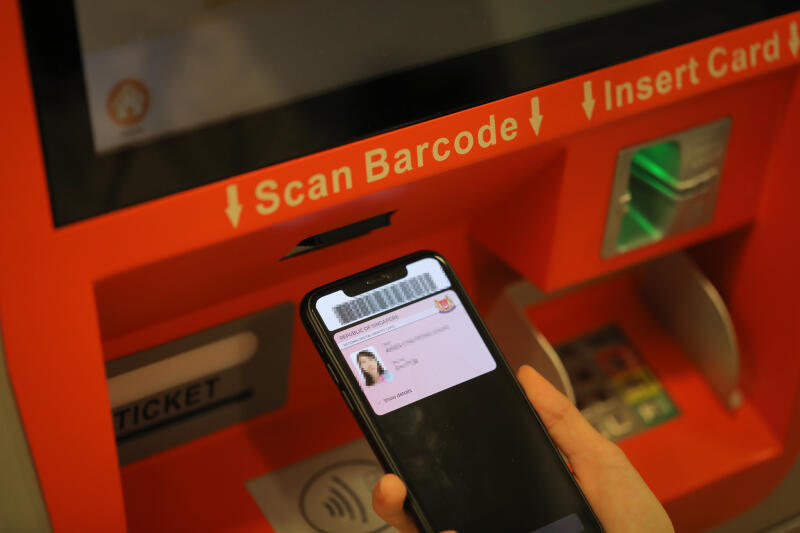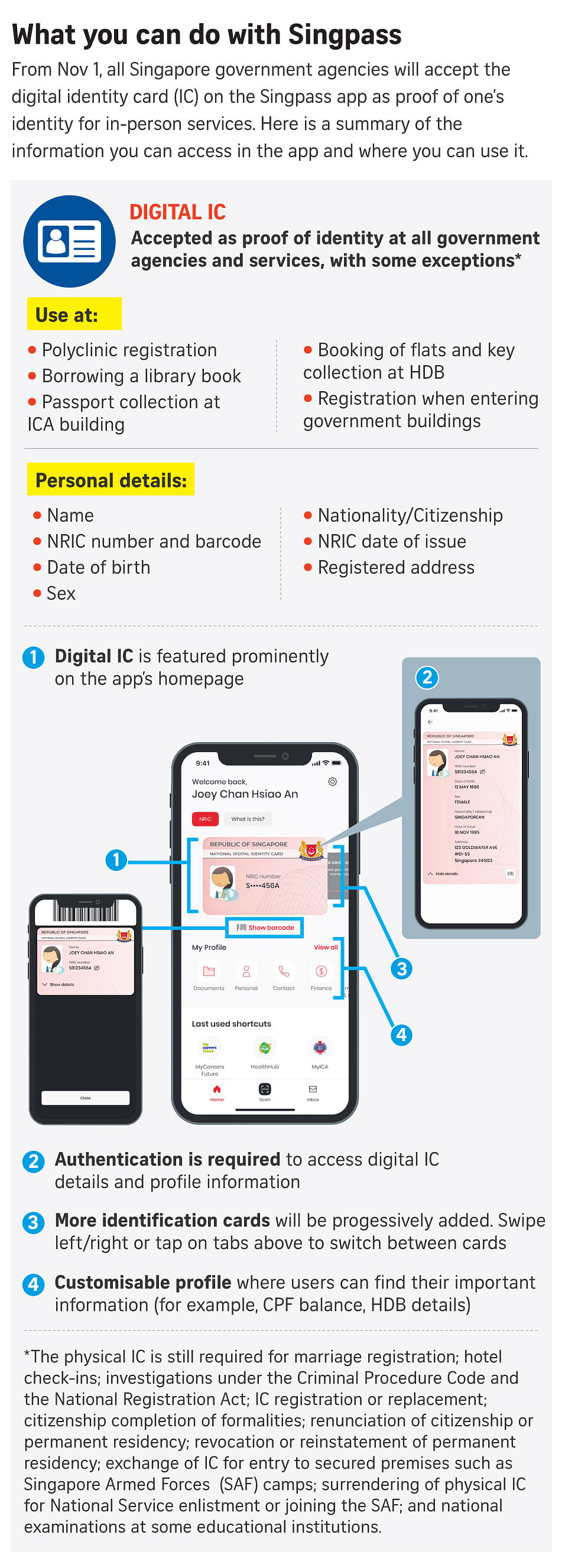Digital IC in Singpass app can be used to access public services in person from Nov 1
Sign up now: Get ST's newsletters delivered to your inbox

From Nov 1, all government agencies will accept digital ICs when individuals use or apply for public services in person.
ST PHOTO: ONG WEE JIN
SINGAPORE - Forgot to bring your NRIC for registering at a polyclinic to see the doctor? Soon, this might no longer be an issue, as people will be able to use the digital identity card in their Singpass mobile app instead.
From next Monday (Nov 1), all government agencies will accept digital ICs when individuals use or apply for public services in person, the Smart Nation and Digital Government Office (SNDGO) and Government Technology Agency (GovTech) said on Thursday.
Besides patient registration, the digital IC can also be used to book appointments at public clinics, register at government buildings for entry, borrow books from public libraries, collect passports, as well as book Housing Board flats and pick up the keys.
For now, there will be some exceptions, such as when the law requires physical identity documents. These include marriage registration, checking into hotels and investigations under the Criminal Procedure Code or the National Registration Act.
SNDGO and GovTech said the Government is working on amending laws to formalise the use of digital ICs for these uses as well.
Other instances in which physical identity documents are still needed include school examinations where phones are not allowed to be brought in, as well as during national service enlistment when physical ICs are surrendered.
Mr Tan Chee Hau, the director of SNDGO's planning and prioritisation directorate, said in a media interview that the Government is in talks with several private sector industries on using the digital IC to sign up for new telco plans or open accounts with banks, among other uses.
The use of the digital IC and other Singpass features will negate the need for businesses to photograph people's identity documents for their records.
From next Monday, public agencies will no longer photocopy people's ICs.
"If government agencies or the private sector need to record (people's details), there are ways to do this without having to take a photo (of the IC)," Mr Tan told reporters.
For example, a feature on Singpass called Verify allows the user to scan a QR code to send his personal details to an organisation.
As a virtual replica of the plastic document, the digital IC contains a person's latest photo submitted to the Government to help with visual checks, and a barcode that can be scanned for their details.
Privacy and security features are built into the virtual document. For example, the Singpass app shows only the last four characters of a person's IC number, which can be revealed only by a fingerprint scan, face scan or a passcode.
The digital IC also has an animated lion head crest which prevents the image from being tampered or spoofed using screenshots of it.
However, the digital IC will not replace the physical document completely. If an IC holder loses his plastic card, he must still report the loss to the Immigration and Checkpoints Authority and apply for a physical replacement.
Doing away with the physical IC altogether needs to be considered carefully, said Mr Tan, noting the legal standing of the NRIC.
Still, from a broader smart nation perspective, he said the digital IC shows that technology can bring convenience to people and improve their daily lives.
"The fact that you can feel at ease going out and about without your wallet and with just a phone because it supports e-payments and has the Singpass digital IC - that's a big step," he said.

ST PHOTO: ONG WEE JIN
GovTech developed the Singpass app and, in May last year, added the digital IC feature.
In the past few months, SNDGO and GovTech worked with public agencies to scale up efforts to get the virtual document accepted. The move was a gradual process that took into account public feedback, said Mr Tan.

For SingHealth Polyclinics, it started recognising people's digital ICs from July last year after some patients asked polyclinic staff if they could scan the virtual document's barcode at self-service kiosks to register and see the doctor.
"There is a confidentiality aspect because the digital IC can be pulled only from Singpass so there's a level of authentication," said Ms Loke Chui Yee, chief operating officer of SingHealth Polyclinics.
The proportion of patients using the digital IC is still very small for now, said Ms Loke. On average, about 30 patients use the virtual card across all of the organisation's polyclinics every week.

SNDGO and GovTech are working with other government agencies to raise awareness of the digital IC among members of the public.
For instance, they are partnering the SG Digital Office to teach seniors at community hubs islandwide how to use the Singpass app and its features, such as the digital IC.
In the coming months, a publicity campaign on the virtual document will also run across various media platforms.
Singpass app users can look forward to being able to change the language used in the app to the other national languages - Chinese, Malay and Tamil - in the next few months as well.
Singpass app users can look forward to being able to change the language used in the app to the other national languages - Chinese, Malay and Tamil - in the next few months as well.
Digital versions of more cards linked to a person's identity - such as driving licences, vocational licences and professional certifications - will be added to the Singpass app later as well.
Currently, 97 per cent of Singaporeans and permanent residents aged 15 and above have Singpass accounts. There are more than 3.2 million Singpass app users, and about 300 million personal and corporate Singpass transactions every year.
For questions on the digital IC, the public can visit the Singpass website, call 6335-3533 or e-mail support@singpass.gov.sg



